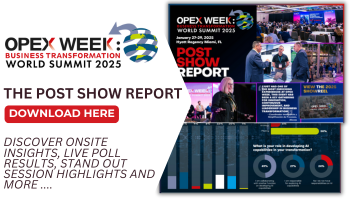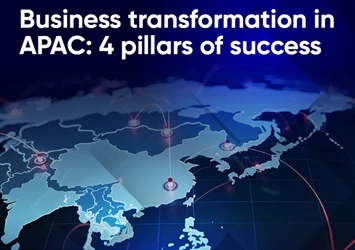7 APAC companies that used Kaizen to achieve operational excellence
Find out how Toyota, Sony, Canon, Honda, Samsung, JTI and Panasonic have implemented Kaizen to improve their manufacturing processes
Add bookmark
In today's competitive global business landscape, companies are constantly looking for ways to improve their operations and stay ahead of the curve. One approach that has gained significant popularity over the years is Kaizen, a philosophy that emphasizes continuous improvement through small, incremental changes. Through Kaizen, many companies throughout the Asia-Pacific region have been able to achieve process excellence, lean manufacturing and operational excellence.
Implementing Kaizen requires more than just a few process tweaks, however; it requires a change in the company's culture and a focus on transformational leadership and change management. In this article, we look at seven organizations from across the APAC region that have managed to get it right.
Join the PEX Network community

Don't miss any news, updates or insider tips from PEX Network by getting them delivered to your inbox. Sign up to our newsletter and join our community of experts.
Learn MoreJump to APAC’s Kaizen innovators:
- Toyota: Pioneering Kaizen via five pillars
- Sony: Continuous improvement as part of a company’s heritage and DNA
- Canon: Recognizing suppliers for their process improvement efforts
- Honda: Improving process visibility to identify and resolve issues
- Samsung: Streamlining task management to improve core productivity pillars
- Panasonic: Embracing Gemba to increase efficiency
- Japan Tobacco International: Exporting high standards throughout Asia
Toyota: Pioneering Kaizen via five pillars
Toyota pioneered the Kaizen philosophy and has been using it successfully since the 1950s to improve its manufacturing processes. Toyota implemented the five pillars of virtue, which include "teamwork, personal discipline, improved morale, quality circles and suggestions for improvement" in all its models, from the Corolla to the Lexus LS 400.
Toyota's spirit of Kaizen dictates that once a certain process can be carried out efficiently by a group of people, they should find ways to accomplish the same task with a smaller group, thereby freeing personnel to move around, work, and learn new tasks.
These capabilities were demonstrated when General Motors came to Toyota for help to turn around their worst-performing plant. Toyota was able to improve the plant's output and quality despite retaining 85 percent of its original personnel. In the early 1980s, Toyota attempted the impossible by making a bonafide contender for the European luxury car segment on their first try with the Lexus LS 400. Toyota's success in perfecting the car assembly process has remained a fascinating case study emulated by many other brands.
Sony: Continuous improvement as part of a company’s heritage and DNA
Sony has implemented Kaizen principles to improve its production processes and remained competitive in the global market for many years as the company's founder, Akio Morita, was a firm believer in the importance of continuous improvement. Sony's engineers and production workers were trained in Deming's principles of quality control, which emphasized measuring and improving processes rather than simply inspecting finished products.
The company also implemented Kaizen workshops, encouraging employees to make suggestions for improving processes and products and creating a system to reward innovative ideas.
One notable example of Sony's use of Kaizen was its development of the Trinitron color television in the 1960s. Sony's engineers recognized the limitations of existing technology and worked together to develop a new production process that improved image quality, reduced costs and increased efficiency. The process involved using a single electron gun for all three primary colors, which made it possible to produce a sharper and more vibrant image.
Canon: Recognizing suppliers for their process improvement efforts
Canon's use of Kaizen has been a vital component of its Canon Production System (CPS). The objectives of CPS have been to manufacture better quality products at lower costs and deliver them faster.
CPS has three basic structures: quality assurance (QA), production assurance (PA) and personnel training (PS) systems. These structures have attempted to achieve just-in-time manufacturing, fast delivery, low cost and visual control. Canon has provided all new employees with a 55-page pocket-size CPS Notebook which offered explanations of CPS and how it can be used to reach Kaizen targets. Employees who make suggestions have been rewarded with points and top accumulators rewarded during the annual President's Awards ceremony.
Additionally, Canon has recognized suppliers that have built promising systems for quality, cost and delivery improvements with gold, silver and special awards.
Honda: Improving process visibility to identify and resolve issues
Honda has implemented Kaizen in its production plants to achieve higher productivity levels and reduce costs. Honda has used visual management techniques, such as Kanban boards and Andon systems, to make processes more visible and easier to manage. This helped employees identify and resolve issues more quickly, leading to improved efficiency and quality.
In Japan and Indonesia, the company implemented Just-In-Time (JIT) principles, which involved producing only what was needed when it was needed to reduce inventory levels, maximize storage and minimize waste. Honda has also collaborated closely with its suppliers to ensure that materials and parts have been delivered on time and in the required quantities.
Samsung: Streamlining task management to improve core productivity pillars
Samsung has been using Lean manufacturing principles and Kaizen to increase production efficiency at its smart factories. The South Korean electronics giant evaluated waste in eight key areas of production: transport, inventory, motion, waiting, overprocessing, overproduction, defects and undeveloped talent. It then systematically analyzed, targeted and eliminated waste in each of these categories in a self-regulating cycle.
Samsung has used mobile devices such as the Samsung Tab Active2 and the Samsung Galaxy Note9 to streamline task management, enabling workers to trim inefficiencies in key lean manufacturing pillars such as defects. Among the biggest advantages of lean manufacturing at Samsung factories has been the continuous and self-auditing cycle which has continually worked toward the goal of improvement in all eight pillars of the lean manufacturing philosophy.
Panasonic: Embracing Gemba to increase efficiency
Gemba is a Japanese term that refers to the actual site where value is created: the shop floor. Gemba is a key concept in Lean manufacturing and continuous improvement methodologies, which emphasize the importance of observing and understanding work processes on an operational level to identify and eliminate waste, improve quality and increase efficiency.
Panasonic Automotive Systems instituted a system called Gemba Innovation, which has aimed to improve onsite operational capabilities. The initiative increased productivity and reduced analysis time and labor by leveraging the capabilities of each Panasonic Group company, such as AI technologies from Panasonic Connect Corporation. Evangelists have been trained to spread the Gemba Innovation mindset around the world and the initiative has taken root at different worksites.
Japan Tobacco International: Exporting high standards throughout Asia
Japan Tobacco International’s (JTI’s) factory in Almaty, Kazakhstan, uses the Japanese philosophy of Kaizen to maintain high standards in manufacturing. The factory manufactures five of JTI's global flagship brands and exports products to central Asia and Mongolia. The Kaizen philosophy encourages the company to always look for ways to improve processes, upgrade technology and find more efficient ways of working.
JTI has worked closely with partners around the world to learn from best practices and share great ideas. For example, in 2015 and early 2016, the company worked on a joint project with partners in Japan to increase the effectiveness of its manufacturing equipment. The Kaizen philosophy helped to simplify the workflow, eliminate waste and improve workplace discipline.
The company is also committed to reducing the environmental impact of its manufacturing processes. In 2016, JTI started using a waste sorting center to dispose of waste, lowering its carbon dioxide emissions by seven percent by connecting the factory to the local gas supply system. The company has also implemented environmentally friendly practices in its daily office work such as by using biodegradable cups, natural cleaning products and manufacturing bags made from eco-friendly materials.
Conclusion: Continuous improvement has helped large APAC organizations consolidate their market positions
Kaizen is a philosophy of continuous improvement that can greatly enhance operational excellence in an organization. This approach encourages businesses to seek out and make incremental improvements to their processes, products and services, leading to increased efficiency, productivity and customer satisfaction.
By continuously analyzing and optimizing their operations, businesses can reduce waste, improve quality and increase profitability. Kaizen also encourages employee engagement by empowering employees to identify areas for improvement and take ownership of their work.
The companies in this article are just a few of the many businesses from the APAC region that are successfully using the Kaizen principle to firmly cement their market position for years to come.
The 26th Annual OPEX Week: Business Transformation World Summit | post show report

Over 550 transformation leaders from 200 companies across 17 countries gathered to share innovations and stories at OPEX Week 2025. The three unforgettable days sparked groundbreaking ideas and invaluable connections. Don't worry—we've got you covered with a full recap of the 2025 OPEX Week. Download the post-show report here.
To view this content, please fill out the form to register and become a member.
Or, if you're already a member, sign in below to view.
Please note: That all fields marked with an asterisk (*) are required.

























